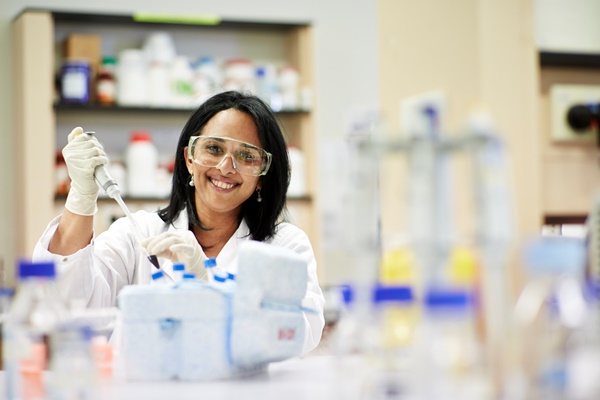Marcus Butler
9 November 2015: University of Canberra-led research is closer to stopping cancer recurrence in thousands of cancer sufferers after receiving more than $1.52 million in research grant funding today
Professor in molecular and cellular biology Sudha Rao and her colleagues have been investigating two diverse problems to improve health outcomes worldwide, with both receiving new funding from the National Health and Medical Research Council (NHMRC).
Professor Rao said one project is working to prevent the spread of primary cancer cells particularly in breast cancer patients, and the second examines the process which allows our bodies to 'remember' viral infections to provide us better immunity.
"I'm very pleased to receive this critical funding, it allows us to continue our work that we have been pursuing for 10 years to get to where we are," Professor Rao said.
"It also means we can keep some of Australia's most talented young people working in this important area of research."
Professor Rao and her research colleagues received $818,131.85 to continue their earlier cancer recurrence prevention research, which is looking to neutralise the protein cells that spread primary cancer around the body.
Professor Rao's work focuses on breast cancer, which remains the leading cause of cancer-related death in women, but she is confident their findings could also be used in tackling other aggressive cancers such as prostate, ovarian and pancreatic cancer.
"By working on the cancer stem cells, which are responsible for cancer travelling around the body and also for cancer recurrence, we are effectively working to switch off the cancer, meaning it can't come back."
"We're determined to solve this problem, to improve the lives of every cancer sufferer and to ensure that when they beat cancer they don't need to worry about it coming back," Professor Rao said.
Professor Rao and her team have also received $708,208 in NHMRC funding for a second project which analyses how the immune system works, particularly around the way our defensive 'T-cells' remember past infections to give us immunity should our bodies encounter them again.
"We don't really understand enough about how these soldiers of the body develop a memory of past infections to better fight them next time, but we do know that as we age this ability starts to fail," Professor Rao said.
"Over the past decade tools and techniques have been developed to probe much deeper into how our bodies work, this funding will allow us to use those tools to understand the bodies T-cells and how their wiring changes as we age."
Professor Rao is hopeful that within five years her research and discoveries would help to deliver a personalised approach to treating disease and would also benefit immunotherapy strategies for cancer.



